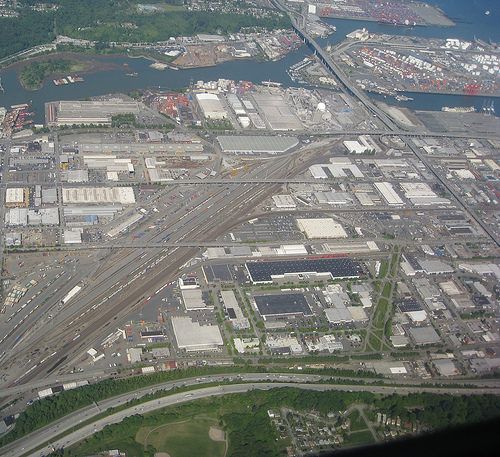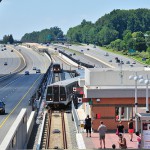Study: Companies near highways should pay for employees’ driving
Just how much can a highway impact the local economy? A new study, “Infrastructure and the shaping of American urban geography,” from Yonn Dierwechter and Ali Modarres aims to find out to what degree businesses benefit from their proximity to the national highway system by studying Seattle and Tacoma, Washington. Given nearly 60 years of investment in the country’s network of highways, there are clear related economic benefits to working — or owning a company — near a highway.

A study indicates that companies located near highways reap massive benefits from proximity, but pass costs on to their own employees and society at large. Image from brewbooks.
As the authors explain, highways and thoroughfares sculpted the United States over the second half of the 20th century. In the process, “these roadways increased national mobility and became major economic veins, transporting American goods and people,” and also transformed the country’s cities and changing their “social, economic, and political geographies.” Highways connected, and continue to link, commuters with their offices, factories and workplaces. And the public largely pays the costs.
Looking at the Pacific Northwest urban area comprising Seattle and Tacoma, the study authors investigate the role of the freeway system is creating a certain “geography” of housing, employment and commuting patterns. Studying six counties in western Washington, the researchers point out that nearly 2/3 of all firms and nearly 70% of all employees in the state, as well as 23% of the firms and 37% of all employees, are located within half a mile of the limited number of highways throughout these counties. These same counties generate 75% of the state’s total sales tax revenue, and firms within just a half-mile of the freeways produce 55% of those funds.
What industries are these? Finance, insurance, and real estate “dominate” the areas within a half-mile of the highways, with the shortest average distance when compared to other industries’ outposts. But these industries, which reap the most benefits from the highways, also contribute the least to their maintenance and improvement: “instead, they pass the cost to others, including their own employees… it is the commuters who, by purchasing fuels and paying the associated federal and state taxes, contribute to infrastructure maintenance,” write the study authors.
Companies like these, explain the authors, help to create an “unequal employment geography,” and then pass along the highway-related costs to their employees. “Should the firms that help generate millions of vehicle miles traveled by their employees pay for their reliance on the American highway system?” The authors offer a resounding ‘yes’: the debate over who should pay for the country’s failing roads and ailing infrastructure “should focus more squarely on who has benefitted, and continues to do so, from this publicly funded infrastructure.”
How might employers pay for their reliance on the employee- and publicly-funded system? One option is to implement a pay-as-you-go system that requires employers to pay for the total vehicle miles driven by the employees, to more equitably address not only the job-housing balance but also much-needed infrastructure improvements. Want to learn more? Check out the related studies which helped inform the authors’ work, including “Does public infrastructure affect economic activity?” and “Commuting and energy consumption: toward an equitable transportation policy.”
Related Posts
Category: Transportation

















